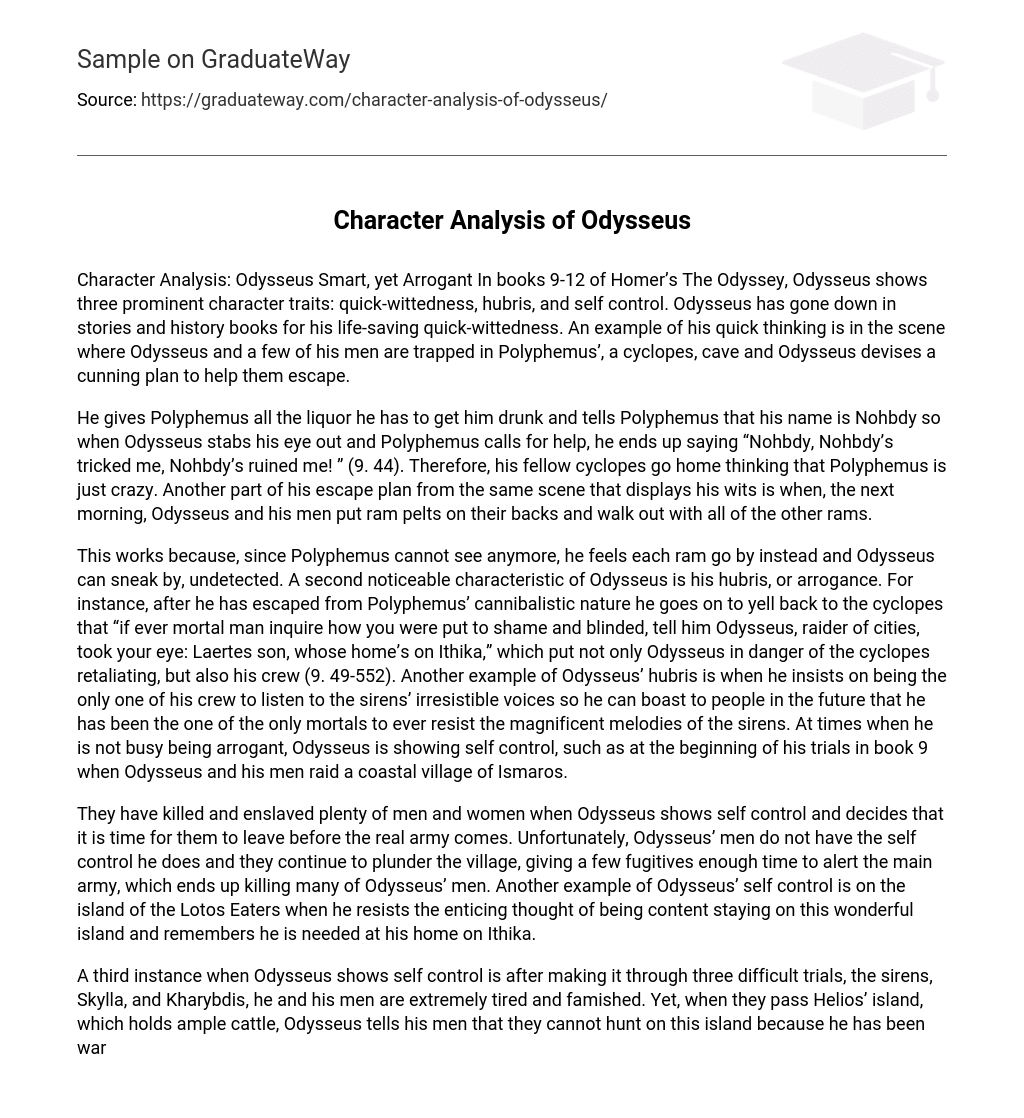Character Analysis: Odysseus Smart, yet Arrogant In books 9-12 of Homer’s The Odyssey, Odysseus shows three prominent character traits: quick-wittedness, hubris, and self control. Odysseus has gone down in stories and history books for his life-saving quick-wittedness. An example of his quick thinking is in the scene where Odysseus and a few of his men are trapped in Polyphemus’, a cyclopes, cave and Odysseus devises a cunning plan to help them escape.
He gives Polyphemus all the liquor he has to get him drunk and tells Polyphemus that his name is Nohbdy so when Odysseus stabs his eye out and Polyphemus calls for help, he ends up saying “Nohbdy, Nohbdy’s tricked me, Nohbdy’s ruined me! ” (9. 44). Therefore, his fellow cyclopes go home thinking that Polyphemus is just crazy. Another part of his escape plan from the same scene that displays his wits is when, the next morning, Odysseus and his men put ram pelts on their backs and walk out with all of the other rams.
This works because, since Polyphemus cannot see anymore, he feels each ram go by instead and Odysseus can sneak by, undetected. A second noticeable characteristic of Odysseus is his hubris, or arrogance. For instance, after he has escaped from Polyphemus’ cannibalistic nature he goes on to yell back to the cyclopes that “if ever mortal man inquire how you were put to shame and blinded, tell him Odysseus, raider of cities, took your eye: Laertes son, whose home’s on Ithika,” which put not only Odysseus in danger of the cyclopes retaliating, but also his crew (9. 49-552). Another example of Odysseus’ hubris is when he insists on being the only one of his crew to listen to the sirens’ irresistible voices so he can boast to people in the future that he has been the one of the only mortals to ever resist the magnificent melodies of the sirens. At times when he is not busy being arrogant, Odysseus is showing self control, such as at the beginning of his trials in book 9 when Odysseus and his men raid a coastal village of Ismaros.
They have killed and enslaved plenty of men and women when Odysseus shows self control and decides that it is time for them to leave before the real army comes. Unfortunately, Odysseus’ men do not have the self control he does and they continue to plunder the village, giving a few fugitives enough time to alert the main army, which ends up killing many of Odysseus’ men. Another example of Odysseus’ self control is on the island of the Lotos Eaters when he resists the enticing thought of being content staying on this wonderful island and remembers he is needed at his home on Ithika.
A third instance when Odysseus shows self control is after making it through three difficult trials, the sirens, Skylla, and Kharybdis, he and his men are extremely tired and famished. Yet, when they pass Helios’ island, which holds ample cattle, Odysseus tells his men that they cannot hunt on this island because he has been warned by Kirke and Teiresias that their fate shall not be good if they do. Unfortunately, his crew, yet again, does not listen and they kill some of Helios’ cattle. And, just like Odysseus told them it would be, they had consequences.





